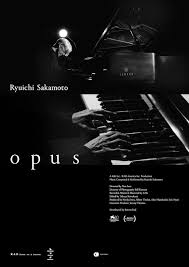
RYUICHI SAKAMOTO: OPUS
Japan, 2024, 103 minutes, Black-and-white.
Ryuichi Sakamoto.
Directed by Neo Sora.
Here is a documentary, a musical documentary, best viewed in a concert hall because, in fact, it is a piano recital on screen. For an individual audience, a small group, it would play well in streaming.
Ryuichi Sakamoto was a celebrated Japanese composer, musician and pianist. He composed a wide range of individual pieces and scored many films in Japan, features and short films, as well as internationally including his early work Merry Christmas, Mr Lawrence for Oshima, collaborations with Bernardo Bertolucci for the Last Emperor, The Sheltering Sky, Little Buddha. And, in later years, scoring the Oscar-winning The Revenant as well as the Japanese drama, one of his last compositions, Monster.
Diagnosed with terminal cancer of the throat, he decided to perform a piano recital for camera just months before he died in March 2023. His son was the director.
For those not familiar with the music of the composer and the recital of scores for films, sometimes the recital is unsettling. It is filmed in black and white (and so many reviewers and commentators have used the word “pristine”) camera focusing on the composer and his performance, close-ups of his hand and fingering, sometimes his pausing and using his hand and arm in the conductor fashion. And the camera moves across the piano, across the room, a variety of angles, a whole range of black-and-white visual compositions.
The film begins very slowly, quietly, the camera at the pianist back, gradually moving towards him, gradually revealing his face, his hands, his playing. While the focus is on the composer and his range of compositions, the film offers something of a masterclass in black-and-white photography and composition.
Sometimes the health of the pianist is precarious, sometimes he is asking for a break, commenting that his playing was not quite right, doing it again. However, with the close-ups on his face, on his white hair, his comment features, this film offers a visual portrait of Sakamoto as well and is a final collection of his compositions.